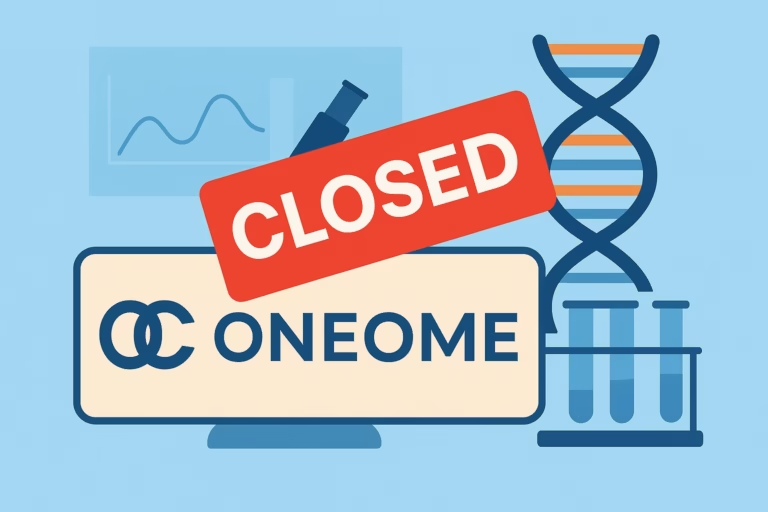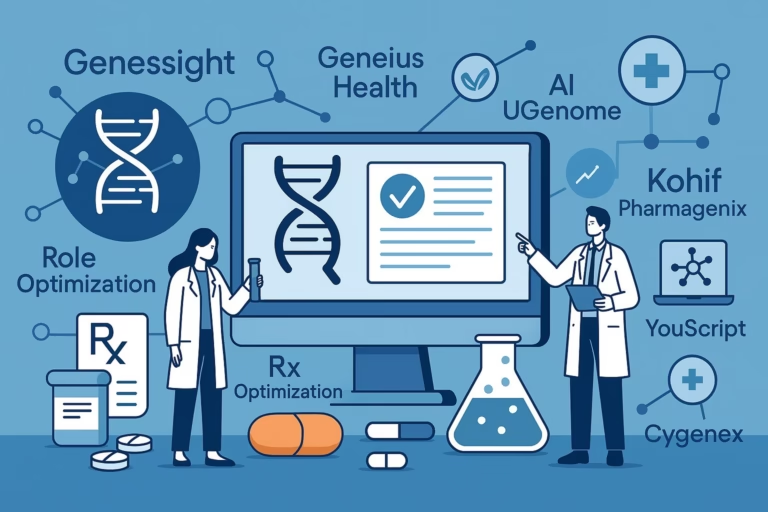“The greatest discovery of my generation is that human beings can alter their lives by altering their attitudes of mind.” – William James. This profound insight into the transformative power of mindset is particularly apt as the pharmaceutical industry teeters on the brink of a revolutionary era, catalyzed by pharmacogenomics. By delving into the intricate nexus between genetics and drug responses, pharmaceutical leaders are on the cusp of revolutionizing treatment development and delivery. In an era where precision medicine is increasingly synonymous with superior healthcare, grasping pharmacogenomics is imperative for business leaders aiming to navigate their organizations through this complex yet promising terrain.
Pharmacogenomics, which scrutinizes the impact of genetic variation on drug metabolism and efficacy, is rapidly reshaping the healthcare sector’s dynamics. Clinical trials now predominantly aim at preventing complications and enhancing health outcomes for specific patient groups, highlighting the significance of targeted therapies1. Furthermore, genetic testing plays a pivotal role in identifying potential disease risks, facilitating early intervention and customized treatment plans1. This shift not only promises to elevate patient care but also to generate substantial savings—over $1,000 annually in medication costs can be anticipated for patients compared to conventional care models2.

The confluence of pharmacogenomics and personalized medicine underscores the imperative for pharmaceutical enterprises to recalibrate their strategies. As clinical decision support systems advance, these technologies provide targeted recommendations based on pharmacogenomic profiles, heralding the advent of more individualized treatment modalities1. As we explore the implications of pharmacogenomics further, it becomes evident that it holds the pivotal role in not only enhancing patient outcomes but also in optimizing costs for healthcare providers and insurers alike2.
Understanding Pharmacogenomics
Pharmacogenomics is a pioneering field within precision medicine, dedicated to customizing medical treatments according to an individual’s DNA. This method seeks to boost drug effectiveness and reduce adverse reactions, thereby enhancing patient outcomes in personalized healthcare. Studies reveal that DNA plays a pivotal role in determining how a person reacts to medications, influencing whether a drug will be effective, ineffective, or even harmful3. Genetic variations can alter the density and types of receptors on cells, impacting the necessary drug dosage3.
The absorption of drugs into tissues is also influenced by genetic factors, affecting both their efficacy and potential accumulation in the body3. For example, genetic variations can control how drugs are metabolized, necessitating specific dosages to achieve therapeutic goals4. This underscores the increasing importance of pharmacogenomic testing, which, although currently restricted to certain drugs, holds a pivotal role in the future of personalized healthcare5.
The surge in pharmacogenomics research over recent years further emphasizes its significance5. The completion of the human genome’s first draft has facilitated significant progress in understanding drug interactions with genetic profiles. These insights have critical implications for drug development, enabling the creation of targeted therapies that address genetic disease causes3 and improve overall treatment efficacy4.
Role of Pharmacogenomics in Precision Medicine
Pharmacogenomics plays a crucial role in precision medicine, enabling healthcare tailored to individual genetic profiles. It explores how genetic variations influence a person’s drug response. Studies reveal that genetic factors account for 20% to 95% of the variability in drug efficacy, sometimes resulting in adverse drug reactions (ADRs)6. Consequently, healthcare technology is increasingly embracing pharmacogenomic profiling to improve treatment outcomes through personalized strategies.
Research has identified pharmacogenomics profiles for about 50% of the medications available today, highlighting the field’s growth6. The significance of genetic testing in pharmacogenomics is underscored by the fact that drug-induced liver injury is a major concern among studied medications6. Moreover, the expansion of personalized therapeutics has accelerated, with the Food and Drug Administration witnessing a significant rise in approvals for medications involving genetic biomarkers7.
Pharmacogenomic insights have revolutionized certain therapeutic areas. This includes cancer, inflammatory diseases, and mental health conditions, where genetic markers can significantly refine treatment plans. For example, identifying the CYP2B6 pharmacogene is crucial for optimizing treatment with cardiovascular and antiretroviral medications like efavirenz6. By integrating genetic testing into clinical practice, healthcare providers can better predict treatment responses and improve patient safety, marking a significant shift in modern healthcare.
Pharmacogenomics and the Pharmaceutical Industry
The integration of pharmacogenomics is transforming the pharmaceutical industry, refining drug development processes. This evolution signifies a departure from the conventional, one-size-fits-all methodology towards more personalized approaches, considering genetic markers. Personalized medicine emerges as a pivotal business strategy, necessitating groundbreaking research and collaborative efforts.
The Evolution of Drug Development
Historically, drug development relied on population-based clinical trials, potentially neglecting individual genetic variations. Approximately 6% of hospital admissions are attributed to adverse drug reactions, highlighting pharmacogenomics’ pivotal role in enhancing medication safety8. Genetic variations profoundly impact drug response, with positive responses ranging from 25% to 80%8. Moreover, over 97% of the population possesses at least one gene variant influencing drug uptake and metabolism8. Certain drugs, like Carbamazepine and Allopurinol, carry warnings due to HLA-B genetic factors, emphasizing the significance of genetic predispositions in treatment strategies9.
Personalized Medicine as a Business Strategy
The pharmaceutical industry increasingly adopts personalized medicine to develop targeted therapies aligned with patients’ genetic profiles. By grasping how genetic polymorphisms affect enzyme function and drug transporter proteins, more precise dosing and administration become possible8. For instance, drugs such as Bupropion and Dextromethorphan take into account CYP2D6 genetic variations to enhance treatment efficacy9. This focus enables pharmaceutical companies to improve patient outcomes and access new, profitable markets, thereby driving growth in drug development endeavors.
Impact on Drug Response and Efficacy
The advent of pharmacogenomics has profoundly altered our comprehension of drug efficacy and response. Genetic variations can account for up to 95% of the variability in drug responses, significantly influencing medication metabolism10. This insight empowers healthcare professionals to customize treatments based on individual genetic profiles, thereby optimizing outcomes and reducing risks. For instance, the dosage of drugs like amitriptyline may need to be adjusted based on pharmacogenomic data to enhance efficacy and diminish adverse effects11.
Pharmacogenomics has significantly enhanced the predictability of drug safety and efficacy during development. Research indicates that drug ineffectiveness is a major reason for clinical trial termination11. Additionally, adverse drug reactions (ADRs) caused by genetic polymorphisms lead to substantial morbidity and mortality in patients12. By deciphering these genetic variations, we can develop more precise therapies, moving away from the outdated one-size-fits-all model.
The liver’s role in drug metabolism, facilitated by cytochrome P450 (CYP) genes, is pivotal in understanding drug response variability across different populations12. Moreover, pharmacogenomics can decrease the costs associated with drug development and improve clinical study success rates by predicting patient responsiveness to specific therapies12.
Technological Advances in Genetic Testing
Genetic testing is undergoing a transformative evolution, reshaping the healthcare technology domain. At the vanguard of this revolution is whole genome sequencing (WGS). This cutting-edge technology scrutinizes the entire genome, offering healthcare professionals a profound understanding of a patient’s genetic profile. Such insights are pivotal in predicting drug efficacy and tailoring treatment plans with unprecedented precision.
The Importance of Whole Genome Sequencing
Whole genome sequencing surpasses traditional methods like PCR in its analytical depth. While PCR targets specific genes, WGS examines the genome’s entirety, unveiling intricate connections between genetic elements and drug responses. The Clinical Pharmacogenomics Implementation Consortium (CPIC) and the Dutch Pharmacogenetics Working Group (DPWG) have established pharmacogenomics guidelines for over 50 drugs linked to 21 genes. This underscores the critical role of genetic testing in the realm of personalized medicine13.
Practical applications of pharmacogenomics arrays are being harnessed by companies. For example, the VeraCode ADME core panel encompasses 184 variants across 34 pharmacogenes. Conversely, the pharmacoscan evaluates 4,627 variants among 1,191 genes, showcasing the ongoing enhancement in genetic testing arrays13.
Emerging Technologies in Pharmacogenomics
Advancements in pharmacogenomics are being driven by emerging technologies, notably artificial intelligence. Genetic data significantly enhances drug development success rates. Research indicates that leveraging genetic data to identify gene-disease associations can double the likelihood of successful outcomes14. The transition from the Sanger Method, which took decades, to next-generation sequencing, which sequences the entire genome in a day, marks a significant leap forward14.
The genetic testing market, now valued at over $13 billion, is projected to reach $28.5 billion by 2026. This growth underscores the profound impact of healthcare technology and genetic testing on the future of personalized medicine14.
Market Trends in Pharmacogenomics
The pharmacogenomics market is experiencing a surge, projected to hit around $16.1 billion by 2032, with an 8.2% compound annual growth rate from 2023 to 203215. This growth is primarily fueled by the increasing incidence of chronic diseases like cancer, diabetes, and cardiovascular disorders. The demand for personalized healthcare, tailored to individual genetic profiles, is also on the rise15. Notably, there were an estimated 20 million new cancer cases globally in 2020, expected to increase by 60% over the next two decades16.
The global pharmacogenomics market was estimated at $7.9 billion in 2023 and is poised for substantial growth. Techniques like high-throughput sequencing are proving cost-effective and efficient in enabling personalized medicine15. North America remains the dominant player, driven by advancements in genomics and gene therapy16. Moreover, personalized medicine is forecasted to lead the market, with the highest CAGR in the coming years16.
Leading companies such as Illumina, Inc., Thermo Fisher Scientific Inc., and F. Hoffmann-La Roche Ltd are well-positioned to leverage this market’s growth. As regulatory bodies increasingly focus on pharmacogenomic data in drug development, we can expect significant breakthroughs in therapy development and administration within the personalized healthcare framework.
Regulatory Landscape and Challenges
The regulatory environment for pharmacogenomics is fraught with obstacles for the pharmaceutical sector, necessitating a nuanced understanding of healthcare regulations. A 2017 survey by the Industry Pharmacogenomics Working Group revealed that 79% of its member companies employ next-generation sequencing (NGS) for pharmacogenomic research, with a significant portion utilizing it extensively17. Moreover, 53% and 71% of respondents reported the application of NGS for whole-genome and whole-exome sequencing in clinical trials, respectively17.
Despite the dominance of NGS in oncology, its utility spans multiple therapeutic domains, including cardiovascular, neuroscience, immunology, and rare diseases17. Nonetheless, the regulatory landscape is evolving, introducing complexities. For example, China’s revised Regulation of Human Genetic Resources imposes severe penalties for non-compliance, posing challenges for multinational corporations operating within its borders17. In Brazil, specific resolutions mandate the sharing of genetic samples for research, further complicating the regulatory framework17.
The EU’s General Data Protection Regulations (GDPR) underscore the imperative for ethical handling of genetic data17. The FDA has also taken steps to regulate laboratory-developed tests (LDTs), including pharmacogenomic ones, subjecting them to rigorous scrutiny effective April 29, 202418. Laboratories seeking FDA approval must navigate a complex process, encompassing development, regulatory submission, and post-market surveillance18.
Healthcare regulations are pivotal in shaping pharmacogenomics practices. The California State Legislature’s passage of AB 425 ensures coverage for pharmacogenomic testing under Medi-Cal, illustrating a trend towards integrating genetic insights into healthcare18. Consequently, pharmaceutical entities must stay abreast of these evolving regulations to align their strategies appropriately.
AI and Data Analytics in Pharmacogenomics
Artificial Intelligence (AI) is revolutionizing pharmacogenomics, introducing novel approaches through data analytics. It excels in analyzing vast datasets, uncovering patterns and correlations that significantly elevate patient care. The synergy of AI with pharmacogenomics empowers healthcare professionals to glean profound insights, particularly when dealing with intricate genomic data.
The Role of Artificial Intelligence
AI is instrumental in tailoring treatment plans. It forecasts how patients will react to medications by scrutinizing gene-drug interactions, highlighting the subtleties that affect drug efficacy and safety19. AI’s predictive capabilities enable the crafting of customized treatment plans, thereby enhancing health outcomes through precision medicine. This innovation is crucial, as it leverages data from clinical, genomic, and metabolic studies to forge more efficacious disease treatments20.
Healthcare systems, including commercial entities like EPIC, leverage continuous data streams to deploy effective healthcare solutions. The digital storage of patient health records through Electronic Health Records (EHR) facilitates efficient diagnosis and complex case management20. Machine learning algorithms, by leveraging mathematical data points, ensure that treatment options are meticulously aligned with patient profiles and genetic backgrounds19.
The advent of AI-driven N-of-1 trials and simulations marks a significant advancement in treatment design, fostering a deeper comprehension of individual responses. Through big data analysis in precision medicine, healthcare providers can discern significant patterns, transforming extensive data into practical insights20. As AI progresses, its cost-effectiveness will spur value-based purchasing among payers, rendering pharmacogenomic testing more attainable for patients with severe conditions19.
Case Studies of Successful Implementation
Pharmacogenomics case studies unveil substantial progress in patient care and healthcare outcomes. The integration of genetic testing into clinical practice has revolutionized treatment protocols, especially for chronic conditions. For instance, a study found that pharmacogenomics in a Medicare Advantage population led to a 15% decrease in hospital days, a 7% reduction in emergency room visits, and a monthly cost savings of $315 per member21.
Another study showcases pharmacogenomics’ efficacy in employee health care settings, achieving a consistent monthly cost savings of $128 per member21. Pharmacogenomic interventions have also resulted in fewer hospital admissions, thereby reducing expenses associated with these high-cost care scenarios. Specifically, costs for care in nursing facilities, which were approximately $2400, significantly increased in hospitals21.
The data underscores the compelling odds ratios for improved drug responses in patients due to pharmacogenomic insights. For example, a remarkable odds ratio of 25 for response to hepatitis C treatment highlights the profound effectiveness of genetic testing22. In breast cancer treatment, the odds ratio of 4.51 for positive response to tamoxifen underscores pharmacogenomics’ critical role in personalized medicine22.

These pharmacogenomics case studies not only demonstrate its potential but also highlight its positive impact on healthcare outcomes. The successful implementations illustrate how leveraging genetic data can lead to tailored therapies, optimizing treatment plans and enhancing patient well-being.
Future Directions for Business Leaders
The pharmaceutical sector’s transformation underscores the critical role of pharmacogenomics for business leaders seeking to maintain competitiveness. The imperative to invest in cutting-edge genetic testing technologies transcends mere drug efficacy enhancement. It also necessitates a harmonization of business strategies with the latest healthcare innovations. Leaders who embrace these advancements will position their entities at the forefront of the industry’s transition towards personalized medicine. This shift is expected to significantly improve patient outcomes and satisfaction.
Furthermore, grasping the regulatory nuances of pharmacogenomic testing is crucial. With agencies mandating pharmacogenomic data for various products, compliance becomes a linchpin for maintaining market presence. The integration of pharmacogenomics into drug development transcends a mere trend; it is a necessity for crafting safer, more efficacious therapies. This underscores the urgency for business strategies that adapt to these evolving industry dynamics in the industry.
Moreover, the application of artificial intelligence in genetic data analysis opens up novel avenues for innovation. AI can streamline pharmacogenomics research and expedite drug discovery by enhancing the identification of candidate molecules. By staying abreast of these market trends, business leaders can ensure their organizations are poised to meet future demands. This readiness will enable them to play a pivotal role in the healthcare sector’s ongoing evolution232425.
Source Links
- Pharmacogenomics Offers New Frontier For Precision Medicine – MedCity News – https://medcitynews.com/2023/11/pharmacogenomics-offers-new-frontier-for-precision-medicine/
- The Pharmacogenomic Frontier – https://www.managedhealthcareexecutive.com/view/pharmacogenomic-frontier
- Pharmacogenomics – https://www.cdc.gov/genomics-and-health/pharmacogenomics/index.html
- Pharmacogenomics – https://my.clevelandclinic.org/health/articles/pharmacogenomics
- Pharmacogenetics and pharmacogenomics – PMC – https://pmc.ncbi.nlm.nih.gov/articles/PMC2014592/
- The Role of Pharmacogenomics Studies for Precision Medicine Among Ethiopian Patients and Their Clinical Implications: A Scoping Review – https://pmc.ncbi.nlm.nih.gov/articles/PMC11226858/
- Pharmacogenomics: Driving Personalized Medicine – PMC – https://pmc.ncbi.nlm.nih.gov/articles/PMC10289244/
- Pharmacogenomics: an overview – https://pharmaceutical-journal.com/article/ld/pharmacogenomics-an-overview
- Table of Pharmacogenomic Biomarkers – https://www.fda.gov/drugs/science-and-research-drugs/table-pharmacogenomic-biomarkers-drug-labeling
- Impact of Pharmacogenomics in Clinical Practice – https://pmc.ncbi.nlm.nih.gov/articles/PMC10675377/
- Role of pharmacogenomics in drug discovery and development – https://pmc.ncbi.nlm.nih.gov/articles/PMC2792612/
- Pharmacogenomics: A Genetic Approach to Drug Development and Therapy – https://www.mdpi.com/1424-8247/17/7/940
- Technologies for Pharmacogenomics: A Review – https://pmc.ncbi.nlm.nih.gov/articles/PMC7761897/
- Genetic Data and Advanced Analytics are Revolutionizing Drug Development – West Monroe – https://www.westmonroe.com/perspectives/report/genetic-data-and-advanced-analytics-are-revolutionizing-drug-development
- Pharmacogenomics Industry Report 2024: Analysis by Technology, Application, End-user, Region, and Company with Growth Forecasts to 2032 – https://www.globenewswire.com/news-release/2024/10/11/2962148/28124/en/Pharmacogenomics-Industry-Report-2024-Analysis-by-Technology-Application-End-user-Region-and-Company-with-Growth-Forecasts-to-2032.html
- Pharmacogenomics Market Growth, Drivers, and Opportunities – https://www.marketsandmarkets.com/Market-Reports/pharmacogenomics-market-142682251.html
- Current challenges and opportunities for pharmacogenomics: perspective of the Industry Pharmacogenomics Working Group (I-PWG) – https://pmc.ncbi.nlm.nih.gov/articles/PMC9177658/
- Pharmacogenomics Testing’s Evolving Landscape: Regulatory Changes, Reimbursement Challenges, and Legislative Advances – https://www.thermofisher.com/blog/clinical-conversations/pharmacogenomics-testings-evolving-landscape-regulatory-changes-reimbursement-challenges-and-legislative-advances/
- Pharmacogenomics: How AI can Advance Personalized Treatment – https://www.tcs.com/what-we-do/industries/healthcare/white-paper/pharmacogenomics-ai-healthcare-personalized-treatment
- Artificial Intelligence, Healthcare, Clinical Genomics, and Pharmacogenomics Approaches in Precision Medicine – https://pmc.ncbi.nlm.nih.gov/articles/PMC9299079/
- Case Studies in Pharmacogenomics – https://www.pharmacytimes.com/view/case-studies-in-pharmacogenomics
- The success of pharmacogenomics in moving genetic association studies from bench to bedside: study design and implementation of precision medicine in the post-GWAS era – https://pmc.ncbi.nlm.nih.gov/articles/PMC3432217/
- Pharmacogenetics and the future of medical practice – https://pmc.ncbi.nlm.nih.gov/articles/PMC1874402/
- Pharmacogenomics: A promising field, not yet ready for widespread use – https://www.mercer.com/en-us/insights/us-health-news/pgx-a-promising-field-not-yet-ready-for-widespread-use/
- What will the future of pharmacy care services look like next year? – https://business.optum.com/en/insights/key-forces-shaping-future-of-pharmacy.html
Pharmacogenomics and the Pharmaceutical Industry: A New Frontier for Business Leaders Pharmacogenomics and the Pharmaceutical Industry is a groundbreaking field that holds immense potential for the future of medical practice and pharmacy care services. Despite its promising prospects, it is important to note that pharmacogenomics is not yet ready for widespread use. Business leaders in the pharmaceutical industry must stay informed about the advancements in pharmacogenomics and its implications for the future of healthcare. Sources: – Pharmacogenetics and the future of medical practice – https://pmc.ncbi.nlm.nih.gov/articles/PMC1874402/ – Pharmacogenomics: A promising field, not yet ready for widespread use – https://www.mercer.com/en-us/insights/us-health-news/pgx-a-promising-field-not-yet-ready-for-widespread-use/ – What will the future of pharmacy care services look like next year? – https://business.optum.com/en/insights/key-forces-shaping-future-of-pharmacy.





